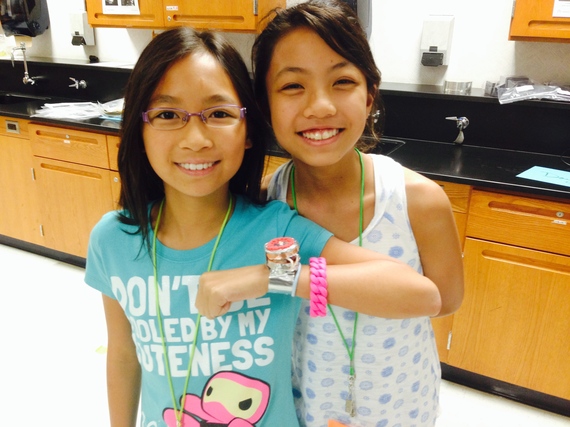Thousands of middle school students in the United States participate in sports teams and camps each year. While broken bones, knee injuries and concussions rise to the top of the fear factor list, the overall perceived benefits seem to largely outweigh the risks for parents of youth involved in sports. Some of these benefits include the building of self-esteem, teamwork, persistence and goal-setting skills.
As children age into their tween and teen years, they tend to drive the decision-making on the types of activities and programs they engage in during their out-of-school time. Sports are a strong magnet for their time and attention. What many of them have yet to experience, however, is that the feelings of winning, success, and victory, along with the beloved adrenaline rush, can also be experienced off the court and field.
As a mother of a son, one of my greatest wishes for him is that he has a wide variety of experiences that give his life balance and make him a well-rounded person. I expect him to take his teamwork skills from soccer and apply them to group projects in school. Likewise, I hope that the persistence skills he gains from working through challenging math problems make their way onto the field.
I feel personally responsible to help guide my own child in integrating his learning experiences in these ways, but I also feel partly responsible for your child, as well. I work for Invent Now, Inc., the parent organization of the National Inventors Hall of Fame, the Collegiate Inventors Competition, Camp Invention, and our latest initiative geared toward 6th through 8th graders -- Invention Project.
My job gives me access to some of the greatest minds in creativity, innovation, invention, and entrepreneurship. I am able to ask these individuals to share what they believe were the key aspects of their childhood and teen years that primed them for success as inventors.
Invention Project is designed around the insights gleaned from our relationships with these inventors. Based on what we have learned first-hand, we know that it is critical to create safe spaces where youth feel supported and encouraged to embrace the type of failures that naturally come along with the prototyping process. The self-esteem building is almost visible when you watch a teen figure out how to make his/her mini-robot travel along a path after initially struggling to power its motor circuit.
This past summer, we saw a silver and pink light-up gadget watch complete with grapple hook inside; a holographic, health-enhancing video game that that was made possible through angel investing; a programmable robot making its way through a sports-themed amusement park; and hundreds of other innovative prototypes and products that the Innovators (the program participants) were excited to bring to market.
As parents of youth who will be part of a workforce (whose job titles have yet to be conceptualized), we have to cultivate whole thinkers, movers, and makers. Instead of just encouraging them to play ball, let's also inspire them to design, patent, and introduce a ball to the world that shifts an entire sport's paradigm.
In a personalized Invention Project video challenge presented by National Inventors Hall of Fame Inductee Garrett Brown (inventor of the SkyCam and Steadicam® camera stabilizer) -- the guy responsible for your viewing pleasure of last weekend's football game -- innovators are advised to look for "what's missing" and to strive to get the impossible shot.
There are many ways for our children to experience teamwork and success on and off the field and the wonderful part is that these experiences can be complimentary. The chances of most of our kids "going pro" are exponentially smaller than the chances of them "going professional." We set our kids up for success when we give them a variety of spaces and places where they can not only make 3-point shots, but where they can also make the impossible shot.
